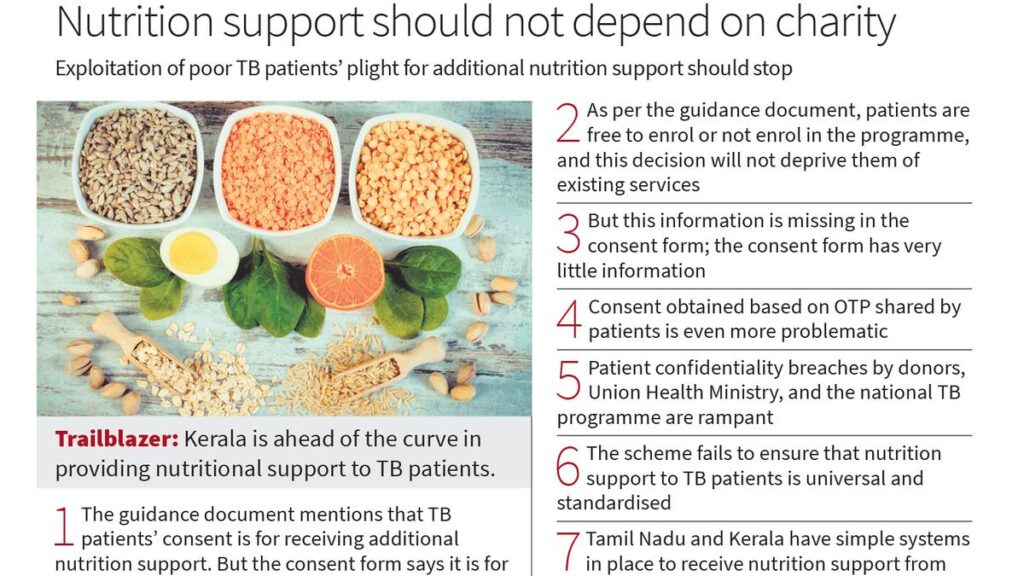The Pradhan Mantri TB Mukt Bharat Abhiyaan launched in 2018, wherein Ni-kshay Mitras can volunteer to provide nutrition support to consented TB patients, is riddled with huge ethical problems. While the guidance document mentions that TB patients’ “consent is for receiving additional [nutrition] support”, TB patients are in effect consenting for something completely different — sharing their data. Receiving additional nutritional support from Mitras is conditional to TB patients sharing their data, as the consent form clearly spells out; TB patients can revoke consent at any point of time.
While the guidance document says TB patients must be told that they are “free to enrol or not enrol in the programme, and this decision will not affect any of the existing services available to the patient” prior to taking consent, this vital information is missing in the consent form. “The consent form for community support is basic with very little information. It is more a declaration than a consent,” says Dr. Anant Bhan, a researcher in bioethics.
It becomes even more problematic when obtaining consent physically is difficult as the process relies on patients sharing the OTP generated from the Ni-kshay portal with NTEP staff. “In this case, patients don’t even get a copy of the consent. How do we know what information is actually shared with patients,” wonders Dr. Bhan.
“The consent is ethically problematic,” says Dr. Amar Jesani, researcher in bioethics and public health. “First, it gives the patients the right to revoke consent without saying that revoking consent would not lead to stoppage of nutritional support. Second, it does not assure the patients that not consenting will not lead to non-provision of [other] nutritional support. On both counts, this consent actually scares or intimidates the patients by conveying that if they want to receive additional support, they must consent to share their information. A starving TB patient will be coerced to consent to sharing of information in this process.”
“If you are a TB patient and nutritionally deprived, is the consent really free and voluntary?” asks Dr. Bhan. Dr. Jesani shares the same view. “Consent ought to be not just informed and understood, but should also be voluntary. The consent here is coercive. Violation of voluntariness is blatant,” says Dr. Jesani. “There are many ways to conduct the programme ethically if one respects patients and their rights. This consent is a testament that they do not respect patients, and so they make no effort to devise an ethical way.”
While donors are required to not use beneficiary data for any purpose other than this programme when registering as a Ni-kshay Mitra, violation of patient confidentiality is rampant. Social media platforms are awash with photographs of TB patients, including children, receiving nutrition kits. The biggest violators are the Union Health Ministry, the Central TB Division, the TB programme, governors, politicians, and organisations. So, it is unsurprising that many testimonials of individual Mitras on the Ni-kshay website have photographs of TB patients receiving nutrition kits from them.
The scheme lacks standardisation and fails to ensure nutrition support to patients is universal. “Also, when there is enough evidence about the importance of nutrition, and when TB elimination is India’s priority, we don’t have to depend on charity to provide nutrition support to TB patients,” says Dr. Bhan.
The important question is this: why are TB patients required to consent to sharing data, and why are TB patients’ data shared with donors? While the guidance document requires the list of consented TB patients to be shared with Mitras each month, Tamil Nadu and Kerala have remarkably demonstrated that maintaining patient confidentiality is indeed possible while ensuring that patients receive nutrition support from Mitras.
Setting an example
In Tamil Nadu, all organisations including NGOs providing nutrition support to patients are required to handover the kits to district TB staff without TB patients coming into the picture; only in exceptional cases are patients asked to meet individual donors. According to an official, such exceptions are made only when individuals insist on ensuring that kits safely reach the beneficiaries. And even in such cases, individuals are prohibited from taking photographs of the patients.
The Differentiated TB Care programme, which is fully operational across Tamil Nadu, identifies TB patients with undernutrition at the time of TB diagnosis. Such patients are prioritised to receive the nutrition kits provided by Mitras, and the district TB officers handover the kits to patients without the donors coming into picture.
Besides ensuring confidentiality of patients is maintained while mapping them with donors, Kerala is ahead of the curve in providing nutritional support to TB patients. Every family of a TB, leprosy or cancer patient with annual income less than Rs.1,00,000 receives financial assistance of Rs.1,000 a month from the State for the entire duration of treatment. Also, the Treatment Support Group, an informal group that came into being in 2018, provides social support, including nutrition, to TB patients as per need so as to enable treatment completion. A few Local Self Government Departments (LSGD) in Kerala — which manage gram panchayats, block and district panchayats, municipalities, and corporations — already provide nutritional support of varying amounts to TB patients immaterial of their nutritional status.
Kerala has now gone a step further. As per a government order of March 6, 2025, from next financial year onwards, every TB patient in the State, no matter his/her nutrition or financial status, will receive nutrition kits worth Rs.1,200 every month for as long as the treatment lasts as part of the LSGD projects.
Published – March 30, 2025 06:00 am IST

